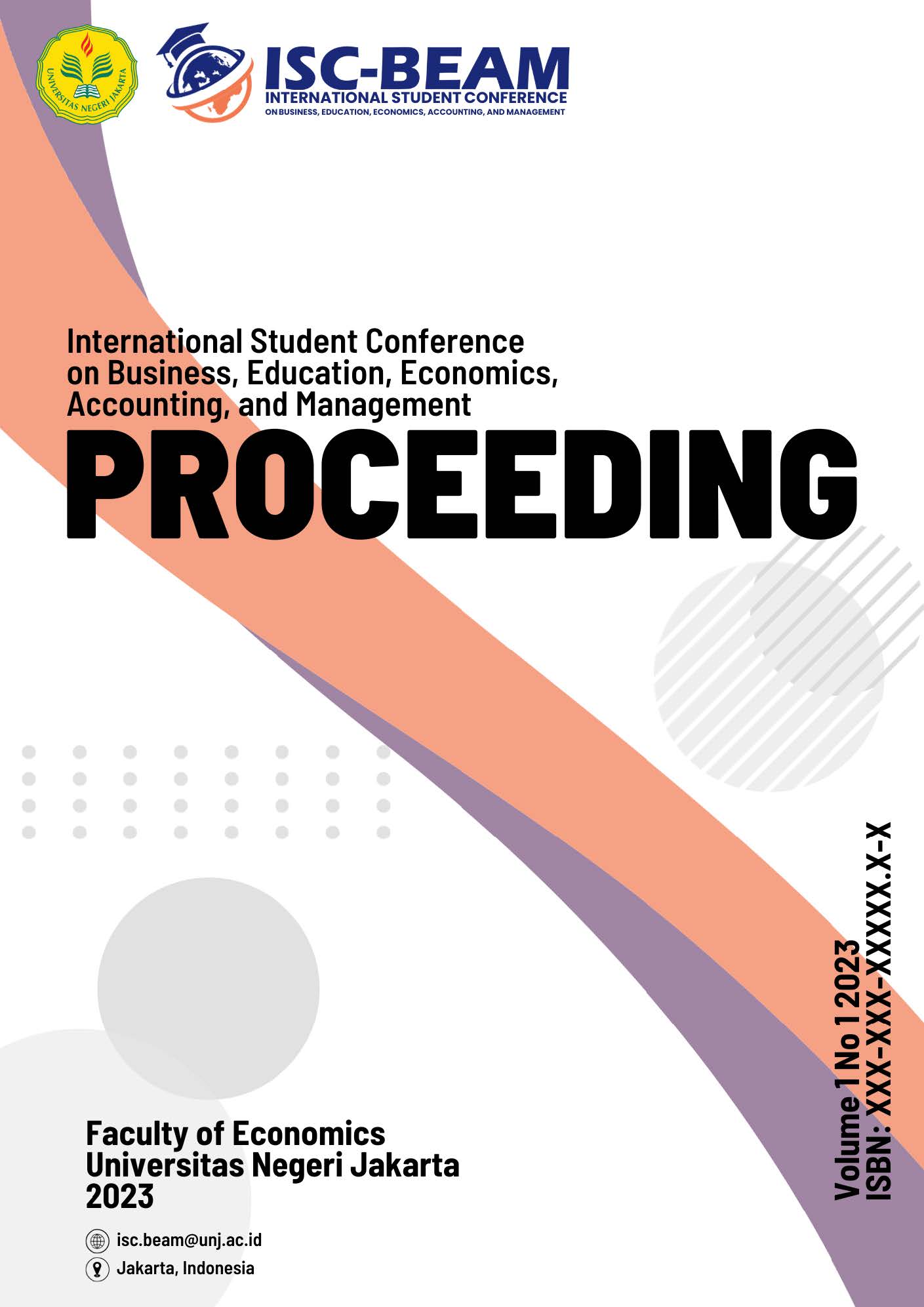Investigating the Impact of the of Technological Developments, Environmental Quality, and Economy on Tourism Receipts in Indonesia
DOI:
https://doi.org/10.21009/ISC-BEAM.011.21Keywords:
Technological Developments, Environmental Quality, Economy, Tourism ReceiptsAbstract
This paper uses a panel technique to investigate the relationship between Technological Developments, Environmental, and GDP Quality on Tourism Receipts in Indonesia (including 33 provinces) for the 2011-2022 period. As a country with rich natural, cultural and ancestral heritage, Indonesia has the potential to attract foreign tourists. Especially with technological advancements that have made tourism promotion possible on a massive scale. On the other hand, an increase in the number of tourists has an impact on the environment as explained in the theory of the Environmental Kuznet Curve (EKC). The research method used is Vector Error Correction Model (VECM) model and Granger causality test. Environmental quality is measured through the Environmental Quality Index indicator. Meanwhile, technology development is measured through the Information and Communication Technology Development Index. The research results explain that Economy, Environmental Quality, and Technological Developments have a positive impact on Tourism Receipts in Indonesia. Therefore, it is important for the government to utilize digital technology to introduce Indonesia's tourism wealth. The increase in tourists must also be accompanied by efforts to protect the environment so that it does not have a negative impact on environmental damage.
References
Azam, M., Alam, M. M., & Hafeez, M. H. (2018). Effect of tourism on environmental pollution: Further evidence from Malaysia, Singapore and Thailand. Journal of cleaner production, 190, 330-338.
Barati, E., Ranjbar, H., & Branch, I. (2016). Granger causality and dynamic relationship between the actual values of receipt derived from tourism, national income and exchange tares in selected countries in selected countries with tourist attraction. International business management, 10(16), 3389-3395.
Ciangă, N., & Sorocovschi, V. (2017). The Impact of Tourism Activities. a Point of View. Riscuri si Catastrofe, 20(1).
Cvetkovski, T., & Cvetkovska-Tomanović, V. (2021). Digital Communication: Convenience or necessity of modern tourism?. Megatrend revija, 18(3), 35-52.
Fafurida, F., Oktavilia, S., Prajanti, S. D. W., & Maretta, Y. A. (2020). Tourism and economic development in Indonesia. International Journal of Scientific and Technology Research, 9(3), 6476-6479.
Heliany, I. (2019). Wonderful digital tourism Indonesia dan peran revolusi industri dalam menghadapi era ekonomi digital 5.0.Destinesia: Jurnal Hospitaliti Dan Pariwisata,1(1), 21-35.
Himawan, H. (2015, July). E-tourism: Antara konsep dan implementasi dalam mendukung industri pariwisata Indonesia. In Seminar Nasional Informatika (SEMNASIF) (Vol. 1, No. 5).
Işik, C., & Radulescu, M. (2017). Investigation of the Relationship between Renewable Energy, Tourism Receipts and Economic Growth in Europe. Statistika: Statistics & Economy Journal, 97(2).
Mahadevan, R., Amir, H., & Nugroho, A. (2017). Regional impacts of tourism-led growth on poverty and income inequality: A dynamic general equilibrium analysis for Indonesia.Tourism Economics,23(3), 614-631.
Nuryyev, G., Wang, Y. P., Achyldurdyyeva, J., Jaw, B. S., Yeh, Y. S., Lin, H. T., & Wu, L. F. (2020). Blockchain technology adoption behavior and sustainability of the business in tourism and hospitality SMEs: An empirical study. Sustainability, 12(3), 1256.
Oktavia, T. (2020). Analisis Pengaruh Teknologi Informasi Dan Komunikasi (Tik) Serta Pendidikan Terhadap Pertumbuhan Ekonomi. In Prosiding National Simposium & Conference Ahlimedia (Vol. 1, No. 1, pp. 139-146).
Prasetyo, A., & Arifin, M. Z. (2018).Pengelolaan Destinasi Wisata yang Bekelanjutan dengan Sistem Indikator Pariwisata. Indocomp.
Saniati, S., Assuja, M. A., Neneng, N., Puspaningrum, A. S., & Sari, D. R. (2022). Implementasi E-Tourism sebagai Upaya Peningkatan Kegiatan Promosi Pariwisata.International Journal of Community Service Learning,6(2).
Santi, R., & Sasana, H. (2021). Analisis Pengaruh Pertumbuhan Ekonomi, Jumlah Penduduk, Foreign Direct Investment (FDI), Energy Use/Consumption dan Krisis Ekonomi Terhadap Kualitas Lingkungan Ditinjau Dari Tingkat Carbon Footprint di Asean 8. Diponegoro Journal of Economics, 10(2).
Scarlett, H. G. (2021). Tourism recovery and the economic impact: A panel assessment. Research in Globalization, 3, 100044.
Seyidov, J., & Adomaitienė, R. (2016). Factors influencing local tourists’ decision-making on choosing a destination: a case of Azerbaijan. Ekonomika, 95(3), 112-127.
Shaliza, A., Syafiqah, W. N., & Sharida, N. (2023). The Impact Of Tourism Industry On Local Economy: Case Of Malaysia. Journal of Islamic, 8(53), 361-374.
Sinclair-Maragh, G., Gursoy, D., & Vieregge, M. (2015). Residents׳perceptions toward tourism development: A factor-cluster approach.Journal of Destination Marketing & Management,4(1), 36-45.
Streimikiene, D., Svagzdiene, B., Jasinskas, E., & Simanavicius, A. (2021). Sustainable tourism development and competitiveness: The systematic literature review. Sustainable development, 29(1), 259-271.
Streimikiene, D., Svagzdiene, B., Jasinskas, E., & Simanavicius, A. (2021). Sustainable tourism development and competitiveness: The systematic literature review. Sustainable development,29(1), 259-271.
Ukpabi, D. C., & Karjaluoto, H. (2017). Consumers’ acceptance of information and communications technology in tourism: A review.Telematics and Informatics,34(5), 618-644.
Wang, Y. S., Li, H. T., Li, C. R., & Zhang, D. Z. (2016). Factors affecting hotels' adoption of mobile reservation systems: A technology-organization-environment framework. Tourism Management, 53, 163-172.
Yuda, M. A. P., & Idris, I. (2022). Analisis Kepadatan Penduduk, Pertumbuhan Ekonomi dan Anggaran Lingkungan terhadap Kualitas Lingkungan Hidup di Indonesia. Jurnal Kajian Ekonomi Dan Pembangunan, 4(2), 53-62.






